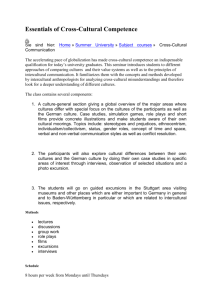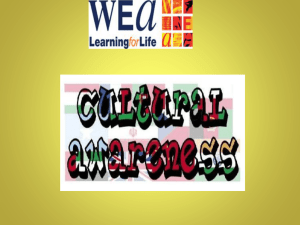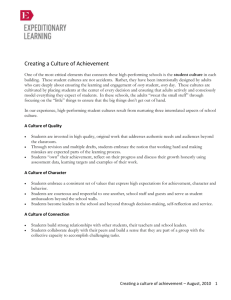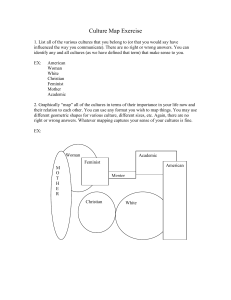Professional standards for lead teachers of languages
advertisement
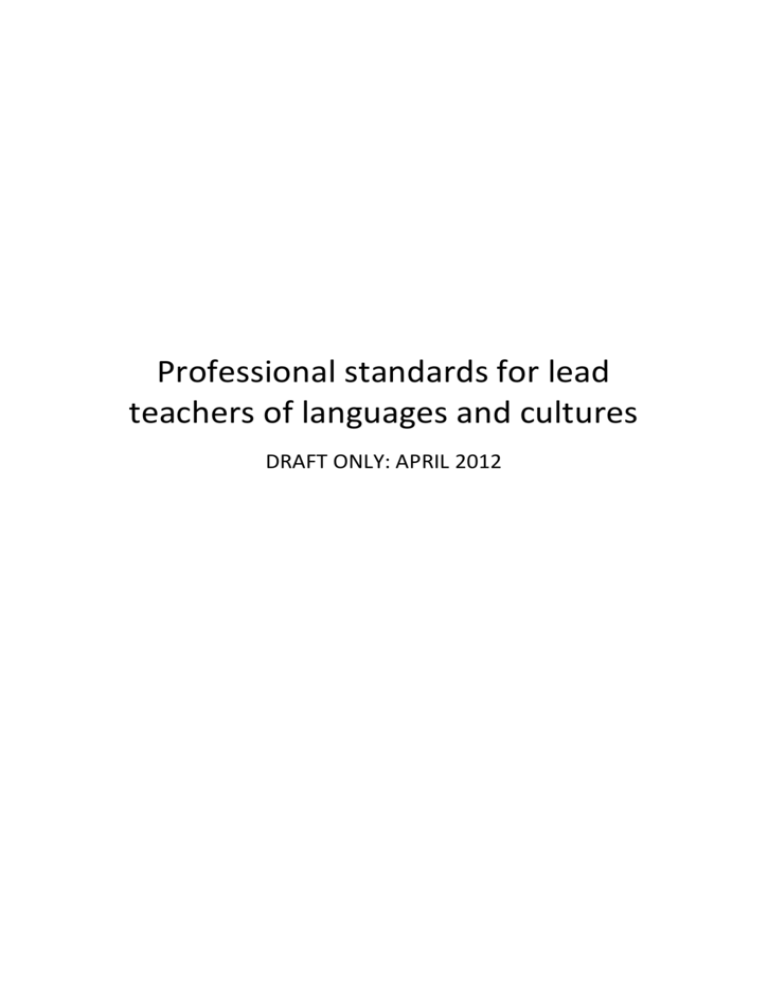
Professional standards for lead teachers of languages and cultures DRAFT ONLY: APRIL 2012 These standards are designed to be read in conjunction with the AFMLTA’s professional standards for accomplished teachers of languages and cultures. The standards for accomplished teachers were designed as aspirational standards that reflect the on-going professional knowledge and conduct of teachers over their entire professional life. The standards for lead teachers grow from the standards for accomplished teachers and reflect a different way of engaging in the profession rather than being simply a higher level achievement. Being a lead teacher of languages and cultures means being a person who knows, uses and teaches language and culture in an ethical and reflective way. It involves a continuous engagement with and commitment to learning, as life-long learner a teacher, a colleague, and a mentor. A lead teacher of languages and cultures has a reflective and theorised view of languages and cultures education and engages with current debates and developments. Lead teachers use their knowledge and insights to engage with the profession of teaching both in and out of schools, support the professional learning of their colleagues and to work towards improving language education as a field. The professional standards for lead teachers have been developed using the categories established in the AFMLTA’s professional standards for accomplished teachers of languages and cultures so that the parallels between each set of standards and ways in which the work of lead teachers develops from the work of accomplished teachers can be preserved and enhanced. The professional standards for lead teachers of languages and cultures are articulated through the following dimensions: • educational theory and practice • language and culture • language pedagogy • ethics and responsibility • professional relationships • awareness of wider context • advocacy • personal characteristics Educational theory and practice Lead teachers of languages and cultures have demonstrated consistent and innovative practice over time. They seek to improve their practice and share their experience and knowledge with others to develop the profession as a whole. They engage with current theories and developments in education and from their engagement lead others to discover and apply this knowledge. They actively lead others to develop their understanding of education polices and curriculum and assessment policy. They take a leading role in developing and implementing language and education policies in their own schools and in the profession more broadly. They work actively with others to create connections between curriculum areas and between teachers of different languages. Language and culture Lead teachers of languages and cultures have a sustained practice of maintaining their knowledge of the language and culture they teach, of intercultural communication, and of general principles of language and culture and their interrelationship. They maintain an active engagement with communities using the languages and cultures they speak through spoken, written and technologically mediated communication and lead others to do the same. 1 They lead others to understand better the language and culture they teach, and the role of language and culture in teaching and learning more generally. They have a developed intercultural awareness, which they model for others in their interactions inside and outside school, and work to increase the intercultural awareness of others in the school and in the wider community. Language pedagogy Lead teachers of languages and cultures have a strong knowledge of contemporary theory, research and practice in language education, in areas including teaching, learning, curriculum, assessment, and evaluation and have a commitment to applying innovations in their own practice and sharing this with others. They reflect on their own practice and share this understanding with others They work with others to identify needs and opportunities for developing knowledge of teaching and learning practice and theory They work with others in designing, implementing and evaluating languages programs and languages and cultures learning models, suitable to different contexts. They communicate to others developments in educational research and practice and support others in applying this knowledge through professional learning. They support others in creating a culture of learning in their classrooms/schools that fosters an interest in and engagement with languages and cultures and encourages learners to accept responsibility for their own learning. They engage actively in supporting and developing languages and cultures programs suitable for the diversity of students in Australian schools. They create a culture of learning in their professional communities through an investigative stance towards teaching and learning, by encouraging others to become involved in investigations of practice. They support others in identifying and selecting appropriate ways of teaching to foster students’ achievements in learning languages and cultures. They are committed to investigation and evaluation in their own practice and support others in the investigation and evaluation of their own practice. Ethics and responsibility Lead teachers of languages and cultures take responsibility for the teaching and learning relationship and for social and cultural relationships in their teaching and lead others to understand and accept this responsibility. They model ethical behaviour in their teaching practice and in their engagement with their professional communities. They model acceptance of multiple perspectives in teaching and learning and encourage others to adopt multiple perspectives in understanding issues so that they can make their own choices and judgments. 2 Professional relationships Lead teachers of languages and cultures provide leadership in their professional communities through informal and formal relationships in their schools, their profession and the wider community. They work to establish professional relationships which benefit the quality and appreciation of teaching and learning of languages. They actively participate in establishing and working within mentoring relationships and establish pathways to support early career and pre-service languages and cultures teachers. They seek leadership positions in representing languages teachers and language learning locally, regionally, nationally and internationally. Active engagement with wider context Lead teachers of languages and cultures actively engage with the social, political, economic, and technological climate of the times and lead others to engage with it. They model connections with a wider sphere of understanding of how languages and language learning relate to wider intellectual and global realities and support others in making these connections. They lead others to an awareness of the impact of languages and cultures on local and global contexts and on how people understand their place in the world, and as culturally situated users of languages. Advocacy Lead teachers of languages and cultures show leadership in advocating for language learning, intercultural communication and intercultural sensitivity, and linguistic and cultural diversity. They are conversant with current national and international literature on languages advocacy strategies and practices. They ensure advocacy for languages both with and for students, teachers, schools and communities and work with the wider community to promote languages. They actively seek to represent language learning and teaching in local, regional, national and, where appropriate, international forums. Personal characteristics Lead teachers of languages and cultures are passionate about the teaching and learning of languages and cultures. They have a commitment to the continued development of the profession as a whole. They connect and engage with learners and colleagues and inspire students, colleagues and others. They are committed the value of multilingualism and intercultural understanding for themselves and for others and model this commitment to students, colleagues and communities. They adopt a critical stance on their own work and to themselves as mediators of languages and cultures, which they demonstrate in their own practice and through their commitment to the professional learning of others. 3


